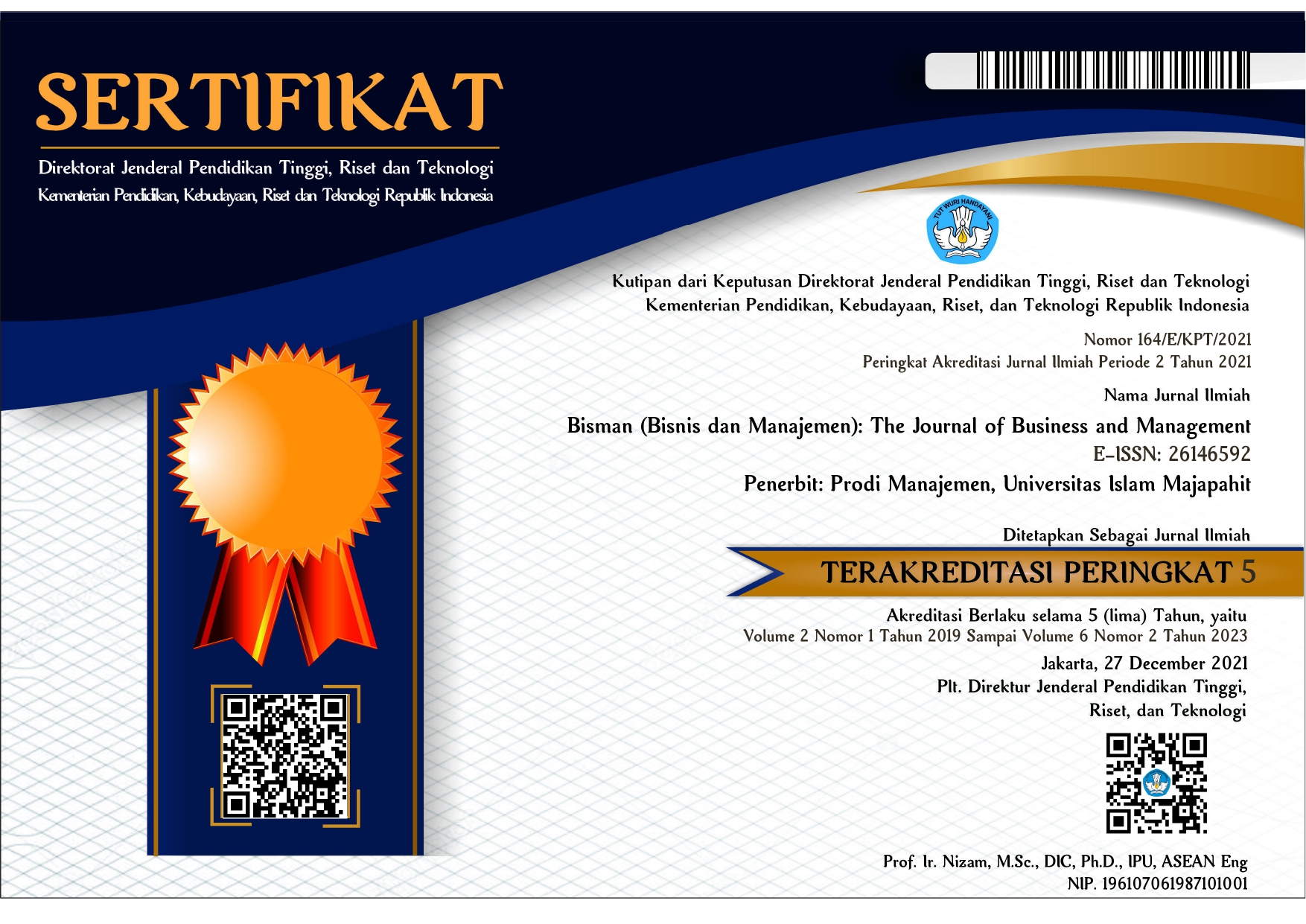The Influence of Leadership, Internal Communication, and Working Motivation on the Employees’ Working Satisfaction at Toserba Mulia Godean Yogyakarta
DOI:
https://doi.org/10.37112/bisman.v5i2.1850Keywords:
leadership, internal communication, work motivation and job satisfactionAbstract
This study aims to determine the influence of leadership, internal communication, and work motivation on employee job satisfaction at Toserba Mulia Godean Yogyakarta and analyze the factors that have a dominant influence on job satisfaction, either partially or simultaneously. This research was conducted at the Toserba Mulia Godean Yogyakarta. The type of research used is quantitative research and this study uses multiple linear regression analysis. The population used in this study were all employees of Toserba Mulia Godean Yogyakarta with a total sample of 80 respondents. Sampling using saturated sampling method and data collection using methods such as observation and questionnaires. The variables in this study are leadership (X1), internal communication (X2), work motivation (X3) and job satisfaction (Y).
From the results of data processing carried out using the multiple linear analysis formula, the following regression equation was obtained: Y= 5,104 + 0,261 X1 + 0,274 X2 + 0,260 X3. It can be concluded from the results of this study that hypothesis testing using the t test shows that the three independent variables studied all have a significant effect from the results which show that the Sig values ??are respectively 0.000 (X1), 0.004 (X2), 0.006 (X3). The F-test of the variables of leadership, internal communication, and work motivation have a simultaneous influence on job satisfaction of the employees of Toserba Mulia Godean Yogyakarta. This can be proven from the results of the F value of 35.137 with a significant level of 0.000 <0.05. The results of the Adjusted R2 test have a value of 56.5%, which means that 56.5% of the job satisfaction variables can be explained by the variables of leadership, internal communication, and work motivation, while 43.5% can be explained that other variables are not examined in this study. this research.
References
A.A. Anwar Prabu Mangkunegara, (2000). Manajemen Sumber Daya Manusia,
Bandung. PT, Remaja Rosdakarya
Effendy, Onong Uchjana. (2011). Ilmu Komunikasi. Teori dan Praktek, Bandung, Rosda.
. (2013). Ilmu Komunikasi Teori dan Praktek. Bandung: PT Remaja Rosdakary
. (2001). Ilmu Komunikasi Teori dan Praktek. Bandung: PT. Remaja Rosdakarya.
Effendi, Usman. (2014). Asas Manajemen. Jakarta: Rajawali Pers.
Robbins, P. Stephen. (2003). Perilaku Organisasi. Edisi Sembilan, Jilid 2. Edisi Bahasa Indonesia. PT Indeks Kelompok Gramedia, Jakarta.
. (2006). Perilaku Organisasi (alih bahasa Drs. Benjamin Molan),Edisi Bahasa Indonesia,Klaten: PT Intan Sejati.
. (2015), Perilaku Organisasi, Penerbit Salemba Empat, Jakarta.
Robbins, P. Stephen & Judges, Timothy A. 2010. Perilaku Organisasi Buku 2. Jakarta: Salemba Empat.
. (2013). Organizational Behavior Edition 15. New Jersey: Pearson Education
Wibowo (2012). Manajemen Kinerja. Jakarta: raja Grafindo Persada.
Downloads
Published
Issue
Section
License
Copyright (c) 2022 Bisman (Bisnis dan Manajemen): The Journal of Business and Management

This work is licensed under a Creative Commons Attribution-NonCommercial 4.0 International License.
Pemberitahuan Hak Cipta
- Seluruh materi yang terdapat dalam situs ini dilindungi oleh undang-undang. Dilarang mengutip sebagian atau seluruh isi situs web ini untuk keperluan komersil tanpa persetujuan dewan penyunting jurnal ini.
- Apabila anda menemukan satu atau beberapa artikel yang terdapat dalam Bisman (Bisnis dan Manajemen): The Journal of Business and Management yang melanggar atau berpotensi melanggar hak cipta yang anda miliki, silahkan laporkan kepada kami, melalui email pada Priciple Contact.
- Semua Informasi yang terdapat di Bisman (Bisnis dan Manajemen): The Journal of Business and Management bersifat akademik. Bisman (Bisnis dan Manajemen): The Journal of Business and Management tidak bertanggung jawab terhadap kerugian yang terjadi karana penyalah gunaan informasi dari situs ini.






